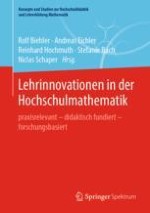2021 | OriginalPaper | Buchkapitel
23. Please mind the gap – Mathematikvorlesungen mit Lückenskript
verfasst von : Anja Panse, Frank Feudel
Erschienen in: Lehrinnovationen in der Hochschulmathematik
Verlag: Springer Berlin Heidelberg
Aktivieren Sie unsere intelligente Suche, um passende Fachinhalte oder Patente zu finden.
Wählen Sie Textabschnitte aus um mit Künstlicher Intelligenz passenden Patente zu finden. powered by
Markieren Sie Textabschnitte, um KI-gestützt weitere passende Inhalte zu finden. powered by
